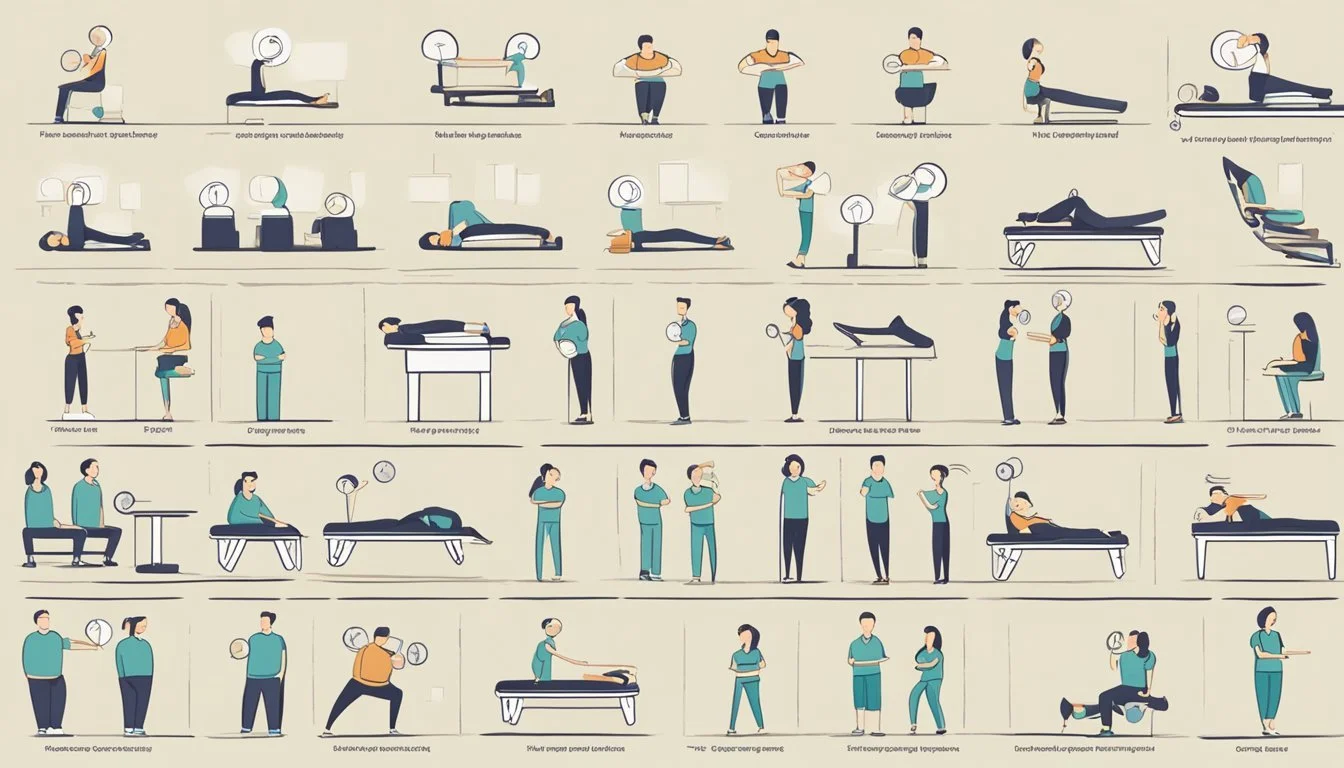12 Simple Exercises to Improve Your Emotional Intelligence
Boost Self-Awareness and Interpersonal Skills
Emotional intelligence plays a crucial role in personal and professional success. It encompasses the ability to recognize, understand, and manage one's own emotions, as well as perceive and influence the emotions of others. Developing emotional intelligence can lead to improved relationships, better decision-making, and increased overall well-being.
Improving emotional intelligence is achievable through simple exercises and consistent practice. These exercises focus on enhancing self-awareness, empathy, social skills, and emotional regulation. By incorporating these techniques into daily routines, individuals can gradually strengthen their emotional intelligence and reap the benefits in various aspects of their lives.
1) Practice Active Listening
Active listening is a crucial skill for improving emotional intelligence. It involves fully concentrating on the speaker and understanding their message without interruption or judgment.
To practice active listening, focus entirely on the person speaking. Maintain eye contact and use non-verbal cues like nodding to show engagement. Avoid planning responses while the other person is talking.
Reflect on what the speaker has said by paraphrasing their main points. This demonstrates understanding and allows for clarification if needed. Ask thoughtful questions to gain deeper insight into their perspective.
Avoid interrupting or offering unsolicited advice. Instead, provide a supportive and open environment for the speaker to express themselves fully. This approach builds trust and strengthens relationships.
Practice active listening in everyday conversations. Pay attention to tone, body language, and emotions behind the words. This exercise enhances empathy and helps develop a more nuanced understanding of others' feelings and experiences.
2) Cultivate Empathy by Volunteering
Volunteering provides a powerful opportunity to develop empathy and enhance emotional intelligence. By engaging in service activities, individuals expose themselves to diverse perspectives and life experiences.
Participating in community service allows people to connect with others facing different challenges. This exposure helps broaden understanding and fosters compassion for various life situations.
Volunteers often work directly with individuals in need, creating opportunities for meaningful interactions. These personal connections can deepen emotional awareness and strengthen the ability to recognize and respond to others' feelings.
Regular volunteering encourages individuals to step outside their comfort zones and view the world through different lenses. This practice helps develop a more nuanced understanding of human emotions and experiences.
Engaging in volunteer work also promotes active listening skills. As volunteers interact with those they serve, they learn to pay closer attention to both verbal and non-verbal cues, enhancing their emotional perception.
Through consistent volunteer efforts, individuals can cultivate a greater sense of social responsibility and interconnectedness. This heightened awareness contributes to improved emotional intelligence in personal and professional relationships.
3) Journal Your Emotions Daily
Journaling emotions is a powerful tool for enhancing emotional intelligence. By regularly recording feelings and experiences, individuals can gain deeper insights into their emotional patterns and reactions.
To start an emotional journaling practice, set aside 15-20 minutes each day to write. Focus on describing current emotions, their triggers, and any physical sensations associated with them.
Be honest and specific when journaling. Instead of simply writing "I feel sad," explore the nuances of the emotion and its context. For example, "I feel disappointed because my project wasn't selected at work."
Consider using prompts to guide the journaling process. Examples include "What made me feel strong today?" or "How did I react to a challenging situation?"
Review journal entries periodically to identify recurring themes or patterns in emotional responses. This self-reflection can lead to increased self-awareness and better emotional regulation.
Remember that emotional journaling is a personal practice. There's no right or wrong way to do it. The goal is to create a safe space for exploring and understanding one's emotional landscape.
4) Read Books on Emotional Intelligence
Reading books on emotional intelligence is an effective way to expand one's understanding of EQ and develop practical skills. Several notable authors have contributed valuable insights to this field.
Daniel Goleman's "Emotional Intelligence" is a seminal work that introduced the concept to a wide audience. It explores the importance of EQ in various aspects of life and offers strategies for improvement.
"Emotional Intelligence 2.0" by Travis Bradberry and Jean Greaves provides a structured approach to enhancing EQ. The book includes a self-assessment tool and targeted exercises for developing specific emotional skills.
Tomi White Bryan's "Emotional Intelligence 3.0" presents a model for understanding emotional development and offers guidance on positively influencing one's EQ.
For those interested in the workplace applications of EQ, "The EQ Edge: Emotional Intelligence and Your Success" by Steven J. Stein and Howard E. Book is a valuable resource.
These books offer diverse perspectives and practical exercises to help readers improve their emotional intelligence. Regular reading and application of the concepts can lead to significant growth in EQ over time.
5) Engage in Mindfulness Meditation
Mindfulness meditation is a powerful tool for enhancing emotional intelligence. This practice involves focusing attention on the present moment without judgment. It cultivates self-awareness and emotional regulation skills.
To begin, find a quiet space and sit comfortably. Close your eyes and take deep, slow breaths. Focus on the sensation of breathing, noticing the air moving in and out of your body.
When thoughts arise, acknowledge them without attachment and gently return focus to the breath. Start with short sessions of 5-10 minutes and gradually increase the duration over time.
Regular mindfulness practice can improve attention, reduce stress, and enhance emotional clarity. It allows individuals to observe their thoughts and feelings with greater objectivity.
This increased self-awareness helps in recognizing emotional triggers and patterns. As a result, practitioners often develop better emotional control and more thoughtful responses to challenging situations.
Incorporating mindfulness meditation into daily routines can lead to lasting improvements in emotional intelligence. Even brief sessions can yield benefits when practiced consistently over time.
6) Take an EQ Training Course
Enrolling in an emotional intelligence (EQ) training course can significantly boost one's EQ skills. These courses offer structured learning experiences designed to enhance various aspects of emotional intelligence.
Participants typically engage in interactive exercises, role-playing scenarios, and group discussions. These activities help develop self-awareness, empathy, and social skills in a supportive environment.
Many EQ courses cover topics such as recognizing emotions, managing stress, and improving communication. They often provide tools and techniques that can be applied in both personal and professional settings.
Some organizations offer in-house EQ training for employees, recognizing the value of emotional intelligence in the workplace. Alternatively, individuals can find courses through universities, professional development centers, or online platforms.
When selecting an EQ course, it's important to consider the instructor's qualifications and the course's focus areas. Some programs may emphasize specific aspects of emotional intelligence, such as leadership or conflict resolution.
Regularly practicing the skills learned in an EQ course can lead to lasting improvements in emotional intelligence. Many courses provide follow-up materials or coaching sessions to support ongoing development.
7) Identify Your Emotional Triggers
Recognizing emotional triggers is a crucial step in developing emotional intelligence. These triggers are specific situations, people, or events that elicit strong emotional responses.
To identify triggers, individuals can pay close attention to their reactions throughout the day. When an intense emotion arises, they should note the circumstances surrounding it.
Keeping a journal can be helpful in this process. Writing down emotional experiences and their contexts can reveal patterns over time.
It's important to examine both positive and negative triggers. Some situations may consistently lead to feelings of joy or excitement, while others might provoke anger or anxiety.
Once triggers are identified, people can prepare for them in advance. This preparation allows for more thoughtful responses rather than impulsive reactions.
Understanding triggers also provides insight into personal values and beliefs. Often, strong emotional responses are linked to deeply held convictions or past experiences.
By recognizing triggers, individuals can develop strategies to manage their emotions more effectively in challenging situations. This awareness is a key component of emotional intelligence.
8) Develop Stress Management Techniques
Developing effective stress management techniques is crucial for improving emotional intelligence. Stress can cloud judgment and hinder emotional regulation, making it essential to have strategies in place to cope with stressful situations.
One effective technique is deep breathing exercises. Taking slow, deliberate breaths can help calm the nervous system and reduce stress levels. This simple practice can be done anywhere, making it a versatile tool for managing stress in various situations.
Mindfulness meditation is another powerful stress management technique. Regular practice can enhance awareness of thoughts and emotions, allowing individuals to respond to stress more effectively. Even short daily sessions can yield significant benefits.
Physical exercise is also an excellent stress reliever. Engaging in regular physical activity releases endorphins, which can improve mood and reduce stress. Activities like walking, jogging, or yoga can be particularly beneficial.
Time management skills can help prevent stress from accumulating. Prioritizing tasks, setting realistic goals, and avoiding procrastination can reduce feelings of overwhelm and anxiety.
Learning to say "no" to unnecessary commitments is another important aspect of stress management. Setting boundaries and protecting personal time can help maintain emotional balance and prevent burnout.
9) Seek Feedback from Others
Seeking feedback from others is a powerful way to enhance emotional intelligence. This exercise involves actively requesting input from colleagues, friends, or family members about one's behavior and emotional responses.
Participants can ask specific questions about how they come across in different situations. They might inquire about their communication style, listening skills, or ability to handle stress.
It's important to approach this exercise with an open mind and willingness to receive constructive criticism. The feedback received can provide valuable insights into blind spots and areas for improvement.
When implementing this exercise, individuals should choose trusted sources who can provide honest and thoughtful feedback. They should also be prepared to listen without becoming defensive.
After receiving feedback, it's crucial to reflect on the information and consider how to incorporate it into personal growth efforts. This process can lead to increased self-awareness and improved emotional intelligence over time.
10) Observe and Mimic Emotionally Intelligent People
Watching and imitating those with high emotional intelligence can be an effective way to improve one's own EQ. Pay attention to how emotionally intelligent individuals handle challenging situations and interact with others.
Notice their communication style, body language, and ability to remain calm under pressure. Observe how they listen attentively and respond thoughtfully to others' concerns.
Try to emulate their approach in your own interactions. Practice active listening, showing empathy, and regulating your emotional responses like they do.
Seek out mentors or role models known for their emotional intelligence. Spend time with them and ask for advice on handling difficult emotions or interpersonal conflicts.
As you observe and practice these behaviors, they will gradually become more natural. Over time, you'll develop stronger emotional intelligence skills of your own.
Remember that this is a learning process. Be patient with yourself as you work to adopt new habits and ways of interacting. With consistent effort, you can enhance your emotional intelligence through observation and practice.
11) Practice Conflict Resolution Skills
Conflict resolution is a crucial aspect of emotional intelligence. Individuals can enhance this skill by engaging in role-playing exercises that simulate real-life disagreements.
One effective method is to practice active listening during conflicts. This involves fully focusing on the other person's perspective without interrupting or formulating rebuttals.
Another technique is to use "I" statements when expressing feelings and needs. This approach helps avoid blame and reduces defensive reactions from others.
Learning to identify common ground and potential compromises is also valuable. By focusing on shared goals, individuals can find mutually beneficial solutions.
Developing the ability to remain calm under pressure is essential. Deep breathing exercises and taking brief pauses can help manage emotions during tense conversations.
Regularly reflecting on past conflicts and identifying areas for improvement can lead to better handling of future disagreements. This self-analysis promotes growth in conflict resolution skills.
Seeking feedback from trusted colleagues or friends about one's conflict resolution style can provide valuable insights. This external perspective often reveals blind spots and areas for development.
12) Set Personal Boundaries
Setting personal boundaries is a crucial aspect of emotional intelligence. It involves clearly defining and communicating one's limits in various relationships and situations.
Effective boundary-setting starts with self-awareness. Individuals must identify their needs, values, and comfort levels in different areas of life.
Once boundaries are established, assertive communication is key. People should express their limits calmly and directly, without aggression or apology.
Consistency is essential when maintaining boundaries. Enforcing them regularly helps others understand and respect one's limits.
It's important to remember that boundaries can be flexible. They may need adjustment as relationships evolve or circumstances change.
Setting boundaries isn't selfish; it's a form of self-care. It helps prevent burnout, reduces stress, and fosters healthier relationships.
Practice is necessary to become proficient at boundary-setting. Start with small, manageable situations and gradually tackle more challenging ones.
By mastering this skill, individuals can improve their emotional well-being and enhance their interactions with others.
The Importance of Emotional Intelligence
Emotional intelligence plays a crucial role in personal and professional success. It enhances relationships, improves communication, and boosts overall well-being.
Benefits in Personal Life
Emotional intelligence strengthens personal relationships. Individuals with high EQ are better at recognizing and managing their own emotions, leading to improved self-awareness and self-control. This enables them to navigate conflicts more effectively and maintain healthier connections with family and friends.
Empathy, a key component of emotional intelligence, allows people to understand and relate to others' feelings. This fosters deeper, more meaningful relationships and increases social support networks.
Emotional intelligence also contributes to better mental health. Those with high EQ tend to experience lower levels of stress and anxiety. They're more resilient in the face of challenges and can bounce back from setbacks more quickly.
Impact on Professional Success
In the workplace, emotional intelligence is often as valuable as technical skills. Employees with high EQ are typically better team players, collaborating more effectively with colleagues. They excel at resolving conflicts and creating positive work environments.
Leaders with strong emotional intelligence inspire and motivate their teams more effectively. They're adept at recognizing team dynamics and addressing issues before they escalate. This leads to increased productivity and job satisfaction among employees.
Emotionally intelligent professionals often demonstrate superior decision-making skills. They're able to balance logic with emotional inputs, resulting in more well-rounded choices. This ability is particularly valuable in high-pressure situations or when dealing with complex interpersonal issues.
Developing Self-Awareness
Self-awareness forms the foundation of emotional intelligence. It involves recognizing and understanding one's own emotions, thoughts, and behaviors.
Understanding Your Emotions
Emotions provide valuable information about our internal state and external environment. To better understand emotions, practice labeling them specifically. Instead of "upset," identify if you feel frustrated, disappointed, or anxious.
Pay attention to physical sensations associated with emotions. Notice where you feel tension, butterflies, or heaviness in your body. These cues can help identify emotions earlier.
Keep an emotion log to track patterns. Note situations that trigger certain feelings and how you typically respond. This data reveals emotional tendencies and habitual reactions.
Self-Reflection Techniques
Journaling offers a private space to explore thoughts and feelings. Set aside 10-15 minutes daily to write freely about your experiences, reactions, and insights.
Try mindfulness meditation to observe your mental processes without judgment. Start with 5-minute sessions, focusing on your breath and noting thoughts as they arise.
Seek feedback from trusted friends or colleagues. Ask for honest observations about your behavior and impact on others. Compare their perceptions with your self-image.
Take personality assessments like the Myers-Briggs Type Indicator or Big Five to gain insights into your traits and tendencies. Use results as a starting point for further reflection.







